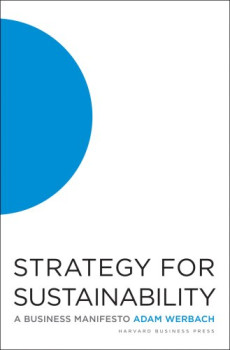
Strategy for Sustainability: A Business Manifesto
Adam Werbach
240 pages, Harvard Business Press, 2009
Adam Werbach is a wunderkind—at age 23, the youngest-ever national president of the Sierra Club—who has never suffered from conformity. When big environmental groups were being self congratulatory, he deflated them with his iconoclastic 2004 speech and essay, “Is Environmentalism Dead?” When it was fashionable to bash Wal-Mart Stores Inc., he was one of a handful of environmentalists who saw promise and jumped in headfirst, creating the Personal Sustainability Project for Wal-Mart’s 1.9 million employees, revealing how to influence the firm’s 200 million regular U.S. shoppers. Werbach went on to help create the “S” division (for sustainability) at the global advertising agency Saatchi & Saatchi.
Now in his mid-30s, Werbach is a fertile innovator of ways to make the world fairer, richer, cooler, and safer, all led by business for profit. He’s distilled his varied experiences into the useful and refreshingly nondoctrinaire book, Strategy for Sustainability.
The thesis of Werbach’s book is arrestingly simple: harness corporations’ capabilities, exploit their aversion to outcomes (like disease, climate change, and poverty) that are ultimately bad for creating a durable business, help them steer by a tall star, and then innovations can help everyone. After all, corporations do rule the world, so how would you have them do it? (Of the world’s 150 largest economic entities, the majority are companies, not countries. Wal-Mart in 2007, for example, was No. 33, bigger than Sweden.)
Fortunately, businesses, coevolving with a vibrant civil society, are the most dynamic force we know. They have the resources, skills, speed, leadership, and motivation to solve big problems quickly and to take those solutions to scale. How they innovate and lead will determine whether their success will bring benefit or harm to others and to the Earth.
The honor roll of firms that grasp this idea and are doing very well by doing good continues to grow and their achievements to inspire. Many have already saved billions of dollars by substituting energy efficiency for fuel—thus proving that climate protection is not costly but profitable. Increasingly, successful firms draw their strategic insights from nature—a 3.8 billion-year experiment in which the 99-odd percent of designs that didn’t work got recalled by the manufacturer, and those that are still around teach us wonderfully about resilient design. Werbach notes scores of those lessons. (He misses a vital one—you can’t get really good without strong competitors—but catches it later by advising firms to engage their critics as improvement advisors.) On this biological foundation, and assembling many companies’ experiences, he builds a rough-and-ready but useful guide to changing corporate culture and operations in order to get ahead of change and build a resilient firm that benefits all.
Werbach prescribes three rules that companies should adopt to remain agile: transparency, engagement, and networking. He explains how both companies and their critics can succeed, not by confrontation but by mutual learning and aikido. The compelling cases in Chapter 4 make this thesis irresistible. Strategy for Sustainability is useful not because it’s long but because it’s bite-sized; not because it’s profound but because it’s simple; not because it’s densely packed with abstruse theories but because it tells vivid and interlocked stories that stick in the brain. It explains the obvious in ways inescapably virtuous, profitable, right, and fun.
I enjoy this book especially because, like my own work, it’s practice, not theory; solutions, not problems; and transformational, not incremental. I might wish that it more systematically applied the operational principles my coauthors and I developed in Natural Capitalism in 1999, but that wouldn’t be fair: This book is about how to set and reach overarching corporate goals, not what the goals should be. Within this modest framework, Werbach has compressed much insight and some wisdom into a compact scope that tells you how to do right, make money, and thereby (to paraphrase Mark Twain) gratify some and astonish the rest.

